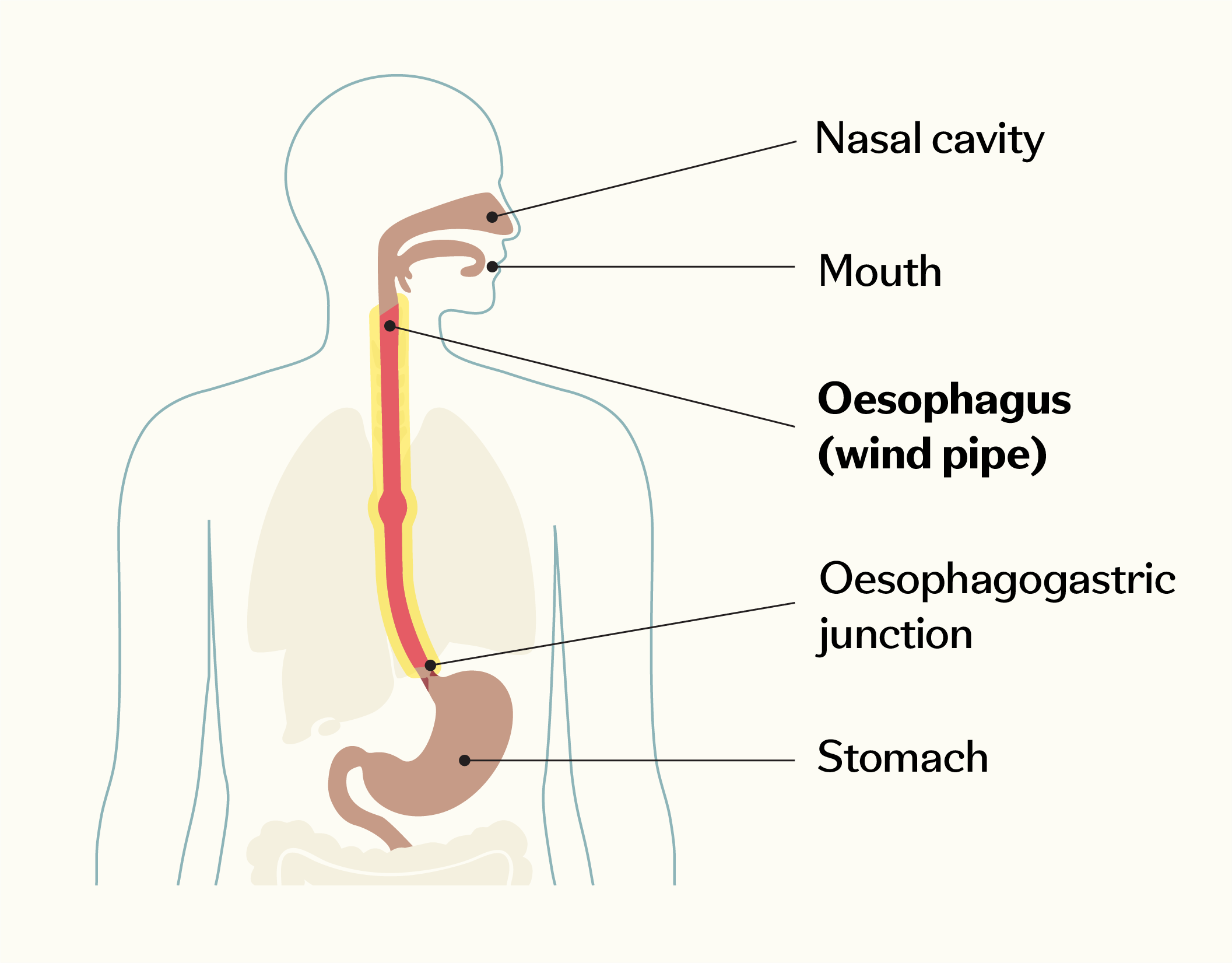The oesophagus
The oesophagus is a long tube that takes food from the mouth to the stomach. It is also known as the food pipe or gullet.i

How oesophageal cancer starts
Cells are building blocks of your body.2 Oesophageal cancer begins when cells in the food pipe begin to grow and divide in an uncontrolled way. It usually starts in the inner part of the food tube and, without treatment, tends to spread outwards through the layers of the tube.1
Around 9,300 people in the UK receive a diagnosis of oesophageal cancer each year.*3
The exact reason for someone getting oesophageal cancer is not usually known. But there are some things that increase someone’s risk of getting oesophageal cancer. These include being male, being over 40 years old, and having medical conditions that cause acid to flow from the stomach up into the oesophagus (such as long-term acid reflux).4
*Estimate based on the average number of people diagnosed with oesophageal cancer in the UK each year between 2016 and 2018.
Types of oesophageal cancer
There are two main types of oesophageal cancer. They start in different types of cells in the oesophagus.1,5
This type starts in cells that make mucus in the oesophagus, which is important for helping food go down into the stomach. These are more often found at the bottom of the oesophagus, close to the stomach. This is the most common type of oesophageal cancer in the UK.6
This starts in cells that line the middle of the food pipe. It tends to happen in the top or middle part of the oesophagus. This type is less common than adenocarcinoma, with around 4 in every 10 people (around 40%) diagnosed with oesophageal cancer having this type.6
Treatment options for oesophageal cancer
The exact treatment someone has for oesophageal cancer depends on a few things, including which type of oesophageal cancer it is, what stage it is (meaning how big it is and whether it has spread to another part of the body), and the person’s general health.3,7
Some common treatments for oesophageal cancer include:3,7
- Surgery: If the cancer is found early, some of the oesophagus may be taken out with surgery
- Chemotherapy: This uses medicines to kill cancer cells. It can be used before or after surgery, or together with radiotherapy. Some people might have chemotherapy to help control the symptoms of late-stage cancer
- Radiotherapy: This uses radiation to kill the cancer cells. It may be used together with chemotherapy for people with early-stage cancer, or alone to help with symptoms of late-stage cancer
- Targeted therapy: These medicines target changes in the cancer cells that allow them to grow and survive in the body. They are only given to people who have a specific type of oesophageal cancer.8
- Immunotherapy: These medicines encourage the body’s immune system to fight the cancer. They tend to be given to people who have advanced oesophageal cancer8
Your treatment plan will be specific to you. It’s important to speak with your healthcare team to fully understand your options and what to expect from your treatment.
Remember that support is available and you’re not alone in this.

If you or someone you know has been diagnosed with cancer, support groups and charities are great places to find information and connect with people going through a similar experience.

Life with cancer is different for everyone. So, if you need support, it should be personal to you. ByYourSide has been created by Pfizer to offer you practical support and guidance to help you manage life with cancer in a way that is best for you.
References
- Cancer Research UK. What is oesophageal cancer? Available from: https://www.cancerresearchuk.org/about-cancer/oesophageal-cancer/about [Accessed May 2025].
- Genetic Alliance. A Guide to Genetics and Health. Washington (DC): Genetic Alliance; 2006. Why is genetics important to my family and me? Available from: https://www.ncbi.nlm.nih.gov/books/NBK115604/ [Accessed May 2025].
- Macmillan. Oesophageal cancer. Available from: https://www.macmillan.org.uk/cancer-information-and-support/oesophageal-cancer [Accessed May 2025].
- Macmillan. Causes of oesophageal cancer. Available from: https://www.macmillan.org.uk/cancer-information-and-support/oesophageal-cancer/causes-and-risk-factors-of-oesophageal-cancer [Accessed May 2025].
- Cancer Research UK. About the stages, types and grades of oesophageal cancer. Available from: https://www.cancerresearchuk.org/about-cancer/oesophageal-cancer/stages-types-and-grades/types [Accessed May 2025].
- Royal Marsden. Oesophageal cancer: signs, symptoms and causes. Available from: https://www.royalmarsden.nhs.uk/private-care/news-and-blogs/oesophageal-cancer-signs-symptoms-and-causes [Accessed May 2025].
- National Health Service. Treatment for oesophageal cancer. Available from: https://www.nhs.uk/conditions/oesophageal-cancer/treatment/ [Accessed May 2025].
- Cancer Research UK. Targeted and immunotherapy drugs for oesophageal cancer. Available from: https://www.cancerresearchuk.org/about-cancer/oesophageal-cancer/treatment/targeted-immunotherapy [Accessed May 2025].
